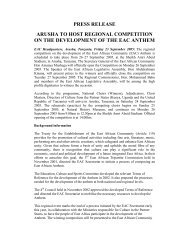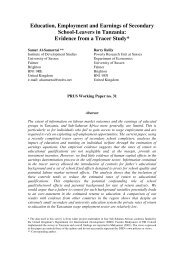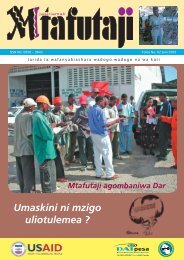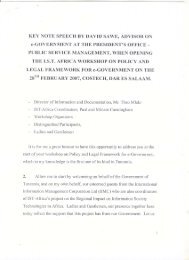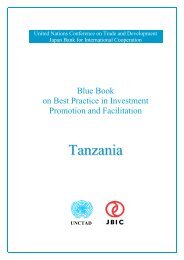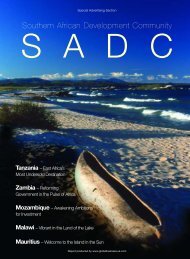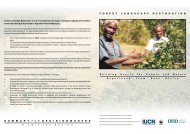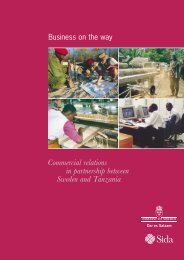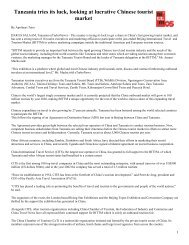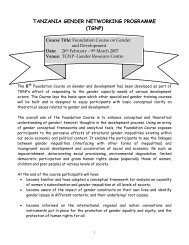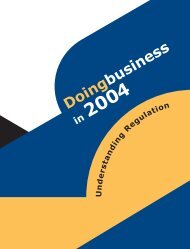September 2005 - Tanzania Development Gateway
September 2005 - Tanzania Development Gateway
September 2005 - Tanzania Development Gateway
Create successful ePaper yourself
Turn your PDF publications into a flip-book with our unique Google optimized e-Paper software.
ASPO Ireland<br />
www.peakoil.ie/newsletters<br />
energy charges and managerial remuneration, as a charge against taxable income has been a huge benefit,<br />
being in effect a form of subsidy. Furthermore, capital gains taxes have helped lock investors into the<br />
market. Indeed, an entire profession wearing the hat of the tax advisor has arisen to help people exploit to the<br />
maximum the anomalies. How all this unravels on the downward side of the mountain remains to be seen,<br />
but it is useful to track the words of the investment community to divine their unfolding reaction to the new<br />
world of decline that Nature imposes.<br />
601. Conserving Europe’s Oil<br />
Western Europe produces almost 5.4 Mb/d of oil and consumes 10.6 Mb/d making it a net importer of 5.2<br />
Mb/d. Of the three North Sea countries which still export, Norway is by far the most prominent, exporting<br />
2.7 Mb/d whereas Britain becomes a net importer next year and Denmark follows ten years later. The<br />
United States imports 11 Mb/d, making increasing purchases on the Rotterdam spot market, which has<br />
brought the price of Brent crude almost to parity with West Texas Intermediate. The Europeans may come to<br />
question the wisdom of exporting their precious resources which they will so desperately need as global<br />
supply constraints deepen in the years ahead. To ask, or pay, Norway to store it in the ground would offend<br />
all the rules of flat-earth globalism, but it would be in Norway’s own best interest. Its four million<br />
inhabitants can’t begin to spend the huge revenues they receive, leading the government to establish an oil<br />
fund of $120 billion, the largest single investment in the world. It is placed on world markets by international<br />
banks where no doubt it will shortly be lost. If they did but know it, the best investment Norway could make<br />
would indeed be to conserve its oil and gas.<br />
602. An impending attack on Iran?<br />
There have been several hints and suggestions that the United States was planning to execute the next<br />
phase of its Middle East policy with an attack on Iran in July, but it did n’t happen, perhaps because the heat<br />
of the summer is not ideal for campaigning. However, new pressures on the country are building on the<br />
pretext of its decision to resume the production of nuclear energy. Iraq, with its population of 26 million, has<br />
proved very difficult to conquer, although showing signs of disintegrating into its Kurdish, Shia and Sunni<br />
factions, while the daily death toll continues to mount. Iran, with its predominantly Shia population of 67<br />
million, may be even more difficult. Meanwhile, Mrs Cindy Sheehan, the grieving mother of a soldier killed<br />
in Baghdad, has camped close to Mr Bush’s summer retreat in Texas, calling for his impeachment.<br />
603. The World begins to wake up<br />
Every day, new articles appear explaining the reality of the unforlding situation, many written by learned<br />
professors. Here is a typical example:<br />
Fears about diminishing supplies could push the United States and other great powers to secure<br />
oil supplies in ways that would ignite a broader conflict with the Muslim world.<br />
http://onlineathens.com/stories/08<strong>2005</strong>/opi_<strong>2005</strong>0820018.shtml<br />
‘Peak oil' is on the way, and we are not ready for it<br />
By Steve A. Yetiv<br />
Budget deficits explode. Inflation rules. Stock markets plunge. Houses foreclose. Great powers clash.<br />
This might be our future if we do not take more serious steps on energy than those offered in the energy<br />
bill President Bush recently signed. With oil prices hitting all-time highs and war raging in Iraq, serious<br />
concerns about "peak oil" slowly have appeared on the public radar screen. Simply put, peak oil refers to<br />
a key turning point when global oil production peaks and then begins to decline, signaling a future of<br />
dwindling supplies.<br />
Analysts predict the peak will occur between 2006 and 2011, that global oil reserves are far more<br />
limited than once thought, partly because leading producers such as Saudi Arabia overestimate or<br />
obfuscate oil reserves, and that we are headed for an energy crunch.<br />
Such concerns might be exaggerated, but we still need to plan ahead more zealously. This is because<br />
whenever peak oil does arrive, it will likely produce three effects for which we are not prepared.<br />
First, in the absence of serious alternatives to oil, oil prices will spike possibly to more than $100 a<br />
barrel in anticipation that demand for oil will slowly outrun supply. That could trigger a global recession<br />
or worse. Even if rising prices spur research into affordable alternatives, it will take many years, perhaps<br />
decades, for the global economy to shift to them because oil penetrates all walks of life. We can't switch<br />
away from it overnight. Even if peak oil comes in 2020 or 2025, we still are behind in the race.<br />
Second, the Middle East will become increasingly important as a supplier, making the world more<br />
vulnerable to its vagaries. It now accounts for about one-third of global oil production. Yet it holds two-<br />
ASPO Newsletter 57, <strong>September</strong> <strong>2005</strong> page 9 of 12



